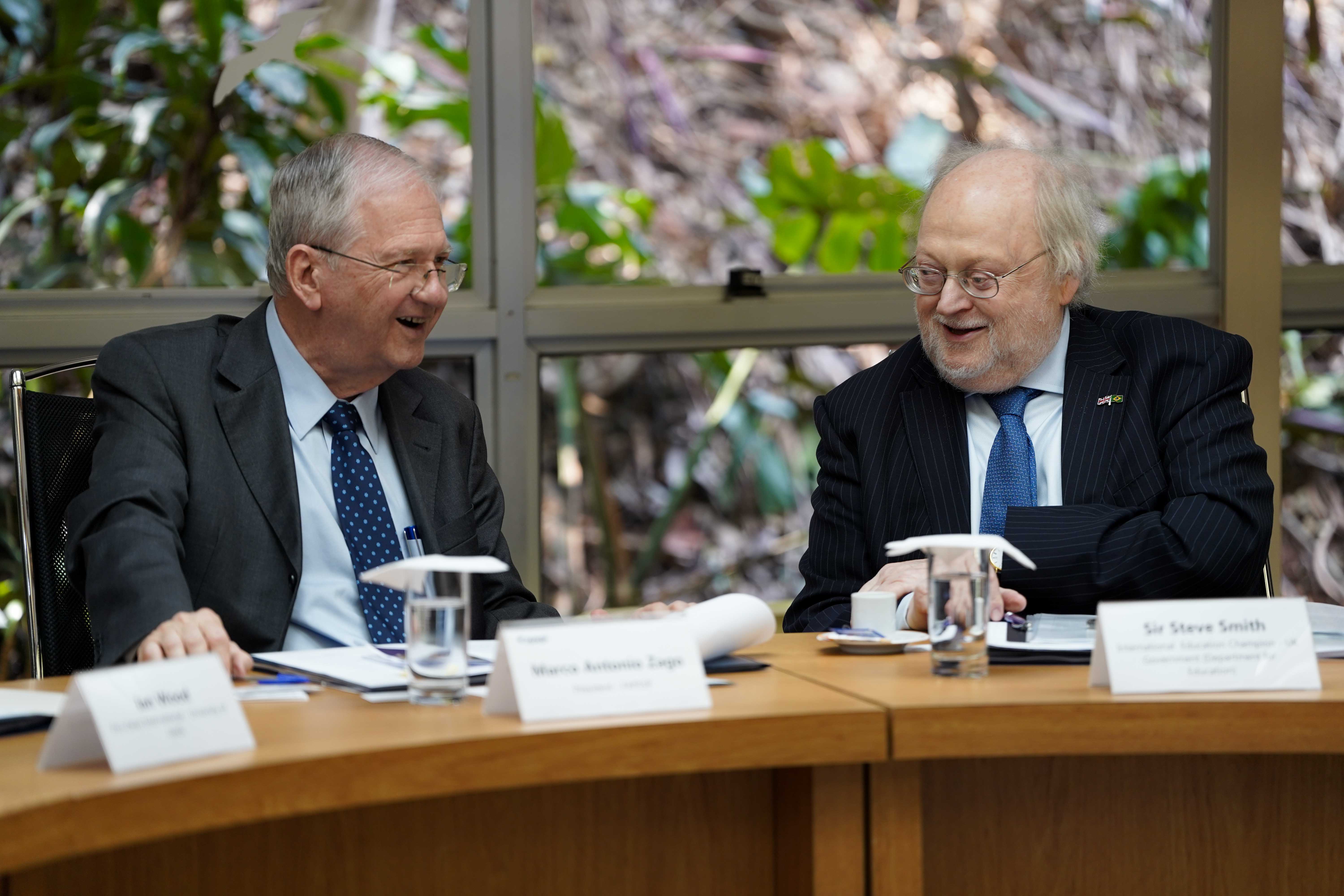

Marco Antonio Zago, President of FAPESP, and Sir Steve Smith, UK Government International Education Champion (photo: Daniel Antonio/Agência FAPESP)
Representatives of the UK Government’s Department for Education and FAPESP discussed strategies to promote more collaboration between researchers based in São Paulo state and at the best British universities.
Representatives of the UK Government’s Department for Education and FAPESP discussed strategies to promote more collaboration between researchers based in São Paulo state and at the best British universities.

Marco Antonio Zago, President of FAPESP, and Sir Steve Smith, UK Government International Education Champion (photo: Daniel Antonio/Agência FAPESP)
By Maria Fernanda Ziegler | Agência FAPESP – Leaders of FAPESP met with representatives of higher education institutions in the United Kingdom and the UK Department for Education on October 7 to discuss ways of increasing collaboration between research institutions in São Paulo state and top-tier universities in the UK. The UK is FAPESP’s second-ranking foreign partner in terms of numbers of research collaborations, behind only the United States.
“The potential for collaboration with Brazil is huge, and the possibilities are very positive. The British government is known to support relations between Brazil and the UK via partnerships between the best British universities and Brazilian research institutions, mostly in São Paulo state, since the evidence shows that their relations work very well for both sides,” said Sir Steve Smith, the UK Government International Education Champion, whose remit is to promote UK excellence and partnerships in education around the world.
Sir Steve noted that he had had the opportunity to keep track of the development of Brazil’s research strategy in recent decades. “At the moment, Brazil’s and the UK’s positions are well aligned, in terms not only of their aspirations but also of the mechanisms of cross-border collaboration. So the time is now. We’re on the same page, and the potential for us to work together is huge,” he said.
The main item on the agenda for the meeting was a discussion of strategies to promote an increase in both the quantity and impact of collaborations between researchers in São Paulo and the UK.
“We have collaborations in a wide array of knowledge areas, but the largest number of joint UK-São Paulo research projects is in health sciences. We need to look at this situation and reinforce it because it’s easier to build on something that’s working well. I don’t mean we should do more of what we’re already doing. I mean we should strive to reach a higher level over and above where we are now,” said Marco Antonio Zago, President of FAPESP.
Zago also stressed the importance of taking into account how collaboration between research centers actually happens. “We have 22 centers that do basic research in accordance with long-term programs (11 years), and 28 centers that do applied science. That’s a total of 50 centers representing São Paulo’s potential research strength. They’re funded both by FAPESP and private enterprise. We could start there to review our strategy and look at these assets as they relate to the UK,” he said.
Another way of promoting research collaboration discussed at the meeting was inspired by an agreement between FAPESP and the U.S. National Science Foundation (NSF). “In order to foster high-level collaboration, in this initiative with NSF we identified specific areas of interest for both countries, such as cybersecurity, STEM education, and geological sciences. In cybersecurity, for example, 30 U.S. researchers will be coming here for meetings and seminars with São Paulo-based researchers,” said Concepta McManus, Manager of Research Collaborations for FAPESP’s Scientific Directorate.
The participants in the meeting were as follows: Ian Wood, Pro-Dean International, University of Leeds; William Cushley, Assistant Vice-Principal International, University of Glasgow; Wendy Alexander, Vice-Principal International, University of Dundee; Jaqueline Wilkins, Regional Director for Latin America, Global Engagement, King’s College London; Helen Bailey, Vice-Principal International, Queen Mary University of London; Julian Chaudhuri, Pro-Vice-Chancellor, Education & Global, University of Bath; Martin Hope, Global Head, Higher Education & Science, British Council; Tom Birtwistle, Country Director Brazil, British Council; Diana Daste, Cultural Engagement Lead Brazil, British Council; Fernanda Hamilton, Head of Science and Innovation Brazil, UK Government Department for Education; Sir Steve Smith, International Education Champion, UK Government Department for Education; Mashalle Asim, Senior Policy Advisor, UK Government Department for Education; Emma Shovling, Head of Europe and The Americas, UK Government Department for Education; Richard Leach, Team Leader for Asia Pacific and the Americas, UK Government Department for Business and Trade; Suzanna Tommasi, Higher Education Specialist, UK Government Department for Business and Trade; Marco Antonio Zago, President, FAPESP; Marcio de Castro Silva Filho, Scientific Director, FAPESP; Raul Machado, advisor to the President of FAPESP; and Concepta McManus and Nadège Mézié, Research Collaborations, Scientific Directorate, FAPESP.
Republish
The Agency FAPESP licenses news via Creative Commons (CC-BY-NC-ND) so that they can be republished free of charge and in a simple way by other digital or printed vehicles. Agência FAPESP must be credited as the source of the content being republished and the name of the reporter (if any) must be attributed. Using the HMTL button below allows compliance with these rules, detailed in Digital Republishing Policy FAPESP.





